4 Tips To Managing Stress In the Workplace
By Admin |
1.9 min read
Everyone who has ever held a job has, at some point, felt the pressure of work-related stress. Stress can affect our quality of life—not only at the office, but in our personal lives as well. Chronic stress can be harmful to both physical and emotional health which is why knowing how to manage work-related stress is important for employees and employers alike. Follow these 4 tips to help manage stress and avoid becoming a burnt-out employee!
- Get enough Sleep
When you’re not sleeping well, you’re not getting the rejuvenating effects that your body needs as a critical recovery period. Sleeping well can help you solve problems with a clearer mind.
Lesson: Work stressors are magnified when we’re sleep-deprived and foggy-brained. Try to get 8 hours of sleep a night!
- Don’t sabotage your productivity!
Although technology has provided employees with greater flexibility, it has also made it more difficult for employees to “unplug”. We are all guilty of getting wrapped up in a project or task and taking work home. However, being “plugged in” 24/7 doesn’t work! Google conducted a study into the lives of its employees that showed after 40 hours we begin to produce diminished results.
Lesson: Set limits for yourself and carve out time for relaxation.

- Don’t be a lone wolf
Having people you enjoy working with is key! Even if all you do is enjoy your time at work together, it certainly makes making it through the workday much easier. Just being able to share a good laugh can alleviate stress.
Lesson: Friendships can help you get through stressful work days.
- Take a Vacation
A staggering 57% of employees don’t use all of their vacation days, leaving an average of 11 days unused! While managers might like that, it isn’t good for productivity and your overall health.Studies show that an annual vacation can cut the risk of death from heart disease by 50% in men and 32% in women.
Lesson: Give your brain a much needed break! Return to work with a fresh perspective and new ideas.
Source: American Institute of Stress, National Sleep Foundation, American Cancer Society, University of New York
Related Blogs
Coaching and Leadership Development: How to Unlock Your Team’s Potential
Coaching and Leadership Development: How to Unlock Your Team's Potential Leadership today is more complex than ever. Expectations are higher, teams are more diverse, and change is constant. Organizations that want to thrive must invest
Create Your Own Weather: The Story, Meaning, and Mission Behind the Brand
Create Your Own Weather: The Meaning Behind the Brand and Its Mission Create Your Own Weather is more than an apparel brand. It is a philosophy rooted in resilience, mindset, and personal leadership. Built on
Layoffs vs. Furloughs: What’s the Difference and Which Is Better for Employers?
Layoffs vs. Furloughs: What's the Difference and Which Is Better for Employers? Economic uncertainty, market shifts, and rapid organizational change force leaders to make difficult workforce decisions. One of the most common challenges leaders face



